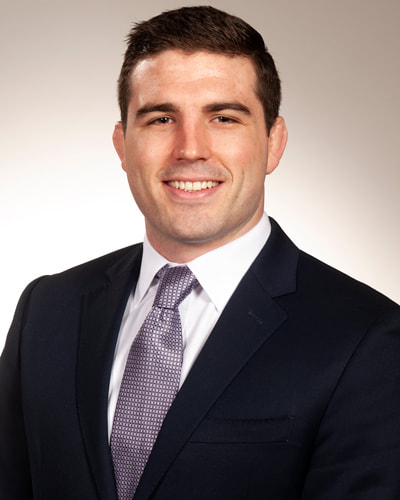Student Research Spotlight
Rex Lutz (DO '21)
August 15, 2019 Rex Lutz (DO ’21) graduated from The Pennsylvania State University in 2015 with a
degree in biology. Following graduation, he decided to focus on orthopaedic research
prior to attending medical school.
Rex Lutz (DO ’21) graduated from The Pennsylvania State University in 2015 with a
degree in biology. Following graduation, he decided to focus on orthopaedic research
prior to attending medical school.
He worked as a clinical research coordinator at Rothman Orthopaedic Institute in Egg
Harbor, New Jersey, with a focus in adult reconstruction and cartilage restoration
before pursuing his doctor of osteopathic medicine degree at PCOM.
What are you studying?
Osteoarthritis is wear and tear of the cartilage in the joints of the body. Total
knee and hip replacements are among the most common treatments of severe and painful
arthritis. My research in adult reconstruction focuses on minimizing complications
and maximizing outcomes in total knee and hip replacement surgeries. Furthermore,
my research in cartilage restoration focuses on treating and mitigating mild osteoarthritis
and its associated pain.
What prompted you to pursue research?
Orthopaedics has always been an area of interest for me and I knew I wanted to contribute
to the field throughout the life of my career. To me, gaining a deeper understanding
of conducting research and how to apply it has been essential for my clinical decision
making. I wanted to feel comfortable analyzing scientific literature and drawing my
own conclusions based on scientific evidence. The clinical research I did prior to
attending medical school has equipped me with a skillset that I will continue to use
in the future.
What experience do you have conducting research?
One of the studies I worked on includes a protocol to reduce the onset of delirium
following total joint replacement. Delirium is a serious complication that can occur
following surgery. We also studied how quickly patients “forget” that they have had
a knee replacement and when their knee feels natural again following surgery. Realistic
expectations are an important part of the surgical conversation. In addition, we studied
the efficacy of autologous stem cells (or stem cells from one’s own tissue, such as
fat) in the treatment of osteoarthritis. I have further interests in perioperative
antibiotic usage in total joint replacement and injury to the lateral femoral cutaneous
nerve (which allows you to feel sensation in your upper leg) in total hip replacement.
What were your responsibilities in the research project?
I collaborated with the physicians and gathered input from multiple surgeons and research
personnel to optimize the design of our research study. I helped collect and analyze
the data and draft the information into a manuscript. Our studies were then presented
at various orthopaedic conferences throughout the world, where we would get feedback
from the orthopaedic community as part of the peer review process. Once we felt that
our data and conclusions reflected a need in the literature, I would submit the manuscript
to an orthopaedic journal and communicate with the editors of the journal to reach
a final product. Following publication, the research is available for orthopaedic
surgeons to read.
In addition to research, I help locally coordinate a program known as Operation Walk, USA. This organization pairs with hospitals and orthopaedic surgeons across the country
to provide free hip and knee replacements to those that are uninsured and do not have
the means to afford the surgery. Fabio Orozco, MD, director, Rothman Orthopaedic Institute’s
South Jersey Adult Reconstruction Fellowship and Zachary Post, MD, Rothman Orthopaedic
Institute, have completed a total of four hip replacements in the past two years for
this cause. Currently, the list of participating surgeons is growing and my goal is
to expand this effort throughout the greater Philadelphia area.
What is the broader impact of your research?
The goal of this research is improving orthopaedics throughout the world. Constantly
pushing the limits through the production of high-quality, evidence-based medicine
will improve patient outcomes and satisfaction. We have great healthcare and technology
in this country and consistent research will continue to improve our knowledge and
understanding of current diseases and treatment.
You May Also Like:
About Philadelphia College of Osteopathic Medicine
Established in 1899, Philadelphia College of Osteopathic Medicine (PCOM) has trained
thousands of highly competent, caring physicians, health practitioners and behavioral
scientists who practice a “whole person” approach to care—treating people, not just
symptoms. PCOM, a private, not-for-profit accredited institution of higher education,
operates three campuses (PCOM, PCOM Georgia and PCOM South Georgia) and offers doctoral degrees in clinical psychology, educational psychology, osteopathic
medicine, pharmacy, physical therapy, and school psychology. The college also offers
graduate degrees in applied behavior analysis, applied positive psychology, biomedical
sciences, forensic medicine, medical laboratory science, mental health counseling,
physician assistant studies, and school psychology. PCOM students learn the importance
of health promotion, research, education and service to the community. Through its
community-based Healthcare Centers, PCOM provides care to medically underserved populations.
For more information, visit pcom.edu or call 215-871-6100.
Contact Us
For general media inquiries, please contact the Office of Marketing and Communications
at 215-871-6300 or communications@pcom.edu. Visit our media relations page to view contact information for public relations personnel.
Connect with PCOM
 Rex Lutz (DO ’21) graduated from The Pennsylvania State University in 2015 with a
degree in biology. Following graduation, he decided to focus on orthopaedic research
prior to attending medical school.
Rex Lutz (DO ’21) graduated from The Pennsylvania State University in 2015 with a
degree in biology. Following graduation, he decided to focus on orthopaedic research
prior to attending medical school.